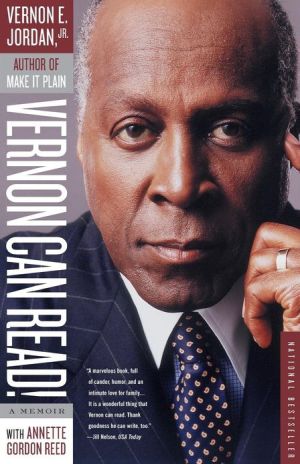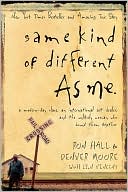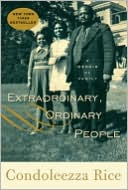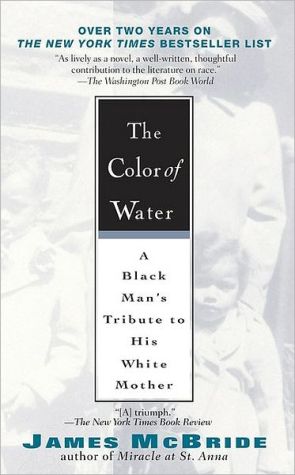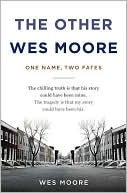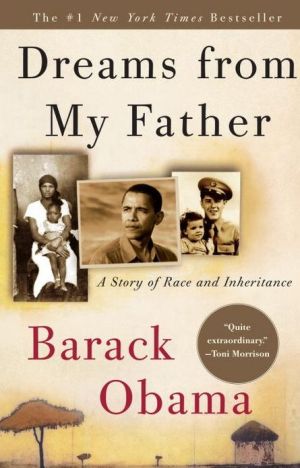Vernon Can Read!: A Memoir
From the civil rights revolution to the halls of power, the life story of a truly larger than life figure: Vernon E. Jordan, Jr.
Search in google:
From the civil rights revolution to the halls of power, the life story of a truly larger-than-life figure, Vernon E. Jordan, Jr.Atlanta Journal-ConstitutionThe greatest value of Jordan's reading is that it tells the listener some things about the man.
From the very beginning, I felt the tug of my mother's hope. It could not have been missed. I moved forward, propelled by her deep ambition and love for me-- two things I never had a moment's doubt about and which moved me to accept her guidance and to want to vindicate her faith in me. It's an almost irresistible challenge, when you have someone who thinks you are special and who works to see that you get the chance to shine. A bargain is struck, sometimes silent, sometimes spoken; their faith and commitment for your effort and success. If success is at all possible, you don't want to fail. You do everything you can not to fail. If there are times when things don't work out as you plan (and that often happens) a hard and honest effort fulfills the bargain. No matter what--you never break faith with those who support you.\ \ This is not to say that I don't have a will of my own, or my own preferences. It just happened (nature or nurture?) that my mother and I were of the same mind on the main point: that I was to go as far as I could as quickly as I could. All children rebel at some points, but for the most part, I believed my mother was right. If she had a plan for my advancement, then I was all for it. I was so confident in my knowledge that, at the end of the day, she wanted what was best for me that I followed her instructions about the important things in life. Until she died, I never made a major decision without consulting her. Sometimes I didn't even get the chance to consult.\ \ "Vernon, Jr., now wherever you go to college, you're going to join the ROTC."\ "I don't want to be in the ROTC."\ "It doesn't matter. Wherever you go to college, you're going to join the ROTC."\ "Mama, what do you know about the ROTC."\ "I don't know anything about the ROTC."\ "Well then, why are you so insistent that I should join it?"\ "All I can tell you is that all the white women I work for are sending their kids to the ROTC. There must be something to it."\ \ "There must be something to it." That was how my mother thought about things. She hadn't figured out exactly why the ROTC was so important to the "white women." I don't believe she knew it was the upper class's method of keeping their young men out of harm's way as they performed their military service. But considering how things were between whites and blacks, the details didn't matter much. It was a simple, straightforward calculation. Whether you were talking about the ROTC, schools, medical care, political power--all the basics of life--white people were hoarding the best of the world and had frozen black people out. It just made good sense to pay attention to where whites were going and how they were using the enormous amount of resources and opportunities they had rounded up for themselves. Whatever was going on that could be good for us; Mama wanted us to be a part of it.
Introduction11My Mother's Son132At Home in the World363DePauw684Chicago Interlude955Howard Law School1086Mr. Hollowell1267Ms. Hurley and the NAACP1448The Dollar and the Ballot1669A World Opened Wide19110Building Blocks20811Building Bridges22812At the Helm24913Endurance27914American Dream, American Reality30115Family Matters317Epilogue331Acknowledgments335Index337
\ From Barnes & NobleVernon Jordan has made the advancement of civil rights his life's goal. As a boy in Atlanta, he learned from his parents how to survive in a Jim Crow world. After graduating from a predominantly white college, he built a legal career, helped desegegrate the University of Georgia, became a field director for the NAACP, and ran the United Negro College Fund and the National Urban League. Jordan's tale is an American success story.\ \ \ \ \ Atlanta Journal-ConstitutionThe greatest value of Jordan's reading is that it tells the listener some things about the man.\ \ \ EbonyAn inspirational life story...[Vernon Can Read!] charts the rise of this charismatic and influential leader.\ \ \ \ \ BooklistNo one can gain a comprehensive view of the movement for equal rights...without paying attention to what Jordan stands for.\ \ \ \ \ New York Times Book Review... a recollection of the pain suffered and the bravery asserted by black Americans...in the struggle for political and economic equality.\ \ \ \ \ Jill NelsonA marvelous book, full of candor, humor and an intimate love for family.... Thank goodness [Vernon] can write, too.USA Today,\ \ \ \ \ Book Page November...candid, worldly, controversial and smart.... a marvelous memoir by a man who knows what to tell and how to tell it.\ \ \ \ \ Publishers WeeklyDismayed that his daughter, Vickee, showed little true comprehension of the world of the Deep South in which he grew up, a world of forced servility and oppression toward blacks, Jordan decided that telling his story would help to "bridge that gap" between their experiences. He set out to write a "very personal take on the black experience since the end of the Second World War." The title of this memoir comes from an incredulous outburst by Robert Maddox, "one of the leading figures in Atlanta's white elite" for whom Jordan worked as a chauffeur while home from college on summer break. The irony is that, although Jordan can write, the actual reading of his writing leaves much to be desired. Often a writer's reading of their own words adds depth to the work. Unfortunately, that formula fails here. The listener does not get the sense of being spoken to; instead Jordan reads in a somewhat formal, oratorical tone. Although the work does a fine job of chronicling the progress of blacks in Jordan's lifetime, it does not delve very deeply into Jordan's personal feelings and beliefs. This production's lack of personality echoes that sentiment. Based on the Public Affairs hardcover (Forecasts, Oct. 15, 2001). (Dec. 18, 2001) Copyright 2001 Cahners Business Information.\ \ \ \ \ Publishers WeeklyWhile Jordan's autobiography garnered interest from the moment its publication was announced, its ultimate form surprises. Disappointment awaits those expecting Clinton/ Lewinsky dirt, since the book "effectively ends in the 1980s. All that has happened to me since then is too close to be considered true memories," Jordan writes. But his narrative mission here is not recent political scandal. Jordan means to "bridge the gap" between the years African-Americans were forced to move to the back of the bus and the time when "a young black girl [Vernon's daughter Vickee] could be so confident in her humanity that she found it unfathomable that anyone could try and take it away from her." The bridge, of course, is Jordan himself, and he tells his success story with a concentration and devotion that gives it all the fervor and logic of a good long speech. While readers are treated to some particulars of Jordan's youth (waiting tables for his mother's catering business, attending segregated Atlanta schools in the 1940s and early '50s and then the predominantly white DePauw University) and the trajectory of his early career as a field director for the NAACP, executive director of the United Negro College Fund and president of the National Urban League), there are few more personal revelations. With its lack of extraneous detail and its studious avoidance of private thoughts, this is less a traditional memoir than an extended exposition of an impressive CV. Even so, it should remind people of this chapter in American history and Jordan's crucial role in it. (Oct. 22) Forecast: With Jordan's high profile, this is an automatic big seller. If it's marketed correctly, it should have a wide appeal, tooanyone interested in the history of the civil rights movement will appreciate this detailed account of the people and organizations that helped transform a segregated nation. Copyright 2001 Cahners Business Information.\ \ \ \ \ KLIATTTo quote from the review of the audiobook in KLIATT, January 2003: This is a moving memoir of courage, kindness and caring that chronicles the details (frequently grim) of growing up, by a distinguished African American leader who came of age just before and during the Civil Rights Movement. Vernon Jordan was raised in Atlanta. His parents taught him the value of hard work, honesty, and getting an education. He went to DePauw University in Indiana, an all-white school, and then got a law degree from Howard. This was followed by years of work as a civil rights leader, working with the NAACP, the United Negro College fund, and finally 10 years as the leader of the Urban League. Then, after opening many doors for black people, he went through them himself and became a successful corporate lawyer. Jordan is a "people person," and his book makes clear the importance of the many business and professional relationships he built up over the course of his life. The book's title is from one of Jordan's early employers who mockingly told his relatives that "Vernon can read!," right in front of him. KLIATT Codes: SA—Recommended for senior high school students, advanced students, and adults. 2001, Perseus, 343p. illus. index., \ — Susan Offner\ \ \ \ \ Library JournalMany will remember Jordan as a close friend of former president Bill Clinton who tried to help intern Monica Lewinsky get a job after she left the White House. Few will note that he was the Georgia field director of the NAACP at the time civil rights leader Medgar Evers was head of the same organization in Mississippi. Jordan also served as executive director of the United Negro College Fund and eventually became president of the National Urban League after the death of Whitney Young. He attended DePaul University in the early days of the Civil Rights movement and worked to secure the rights of blacks in Georgia. This is a standard, run-of-the-mill autobiography until Jordan reveals the assassination attempt on his life and his decision to leave the Urban League to join a private law firm. The author's reading is flat at points, and his Southern accent and mispronunciations are grating; one wishes that an actor had been employed to provide some emotion and continuity to the narration. Recommended for libraries with African American history, biography, and American studies collections. Danna Bell-Russel, Library of Congress Copyright 2002 Cahners Business Information.\ \
